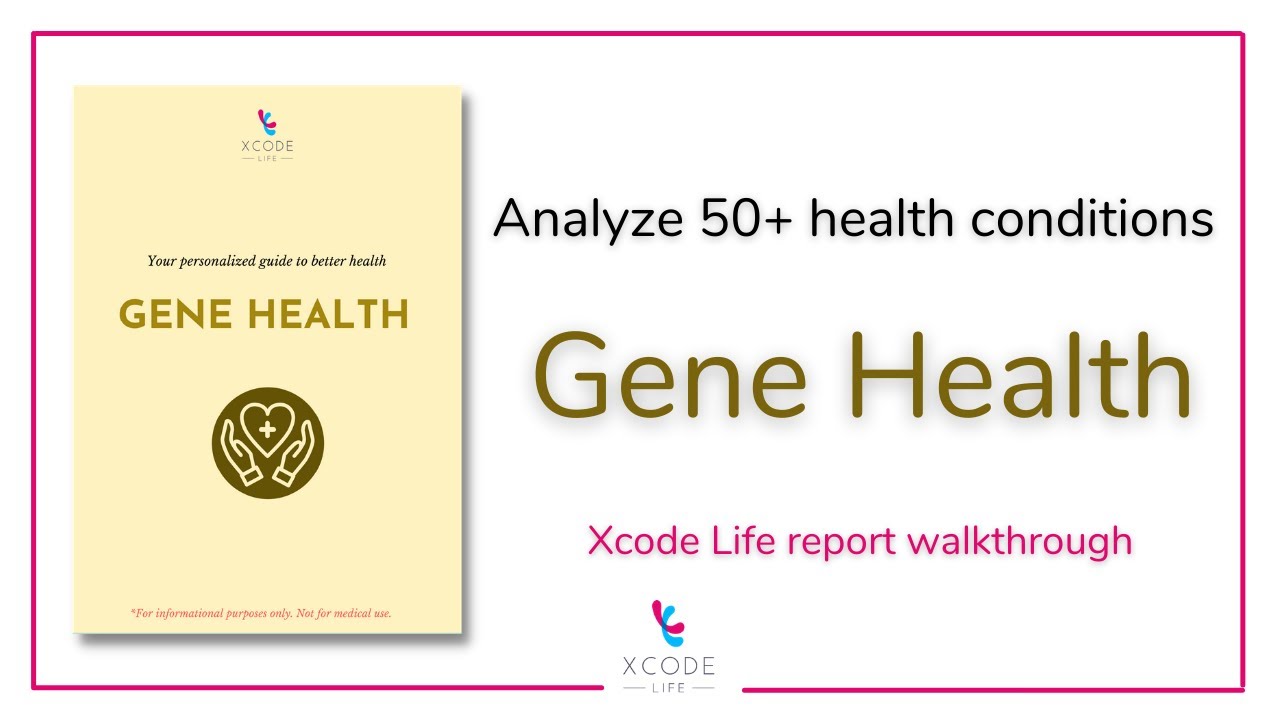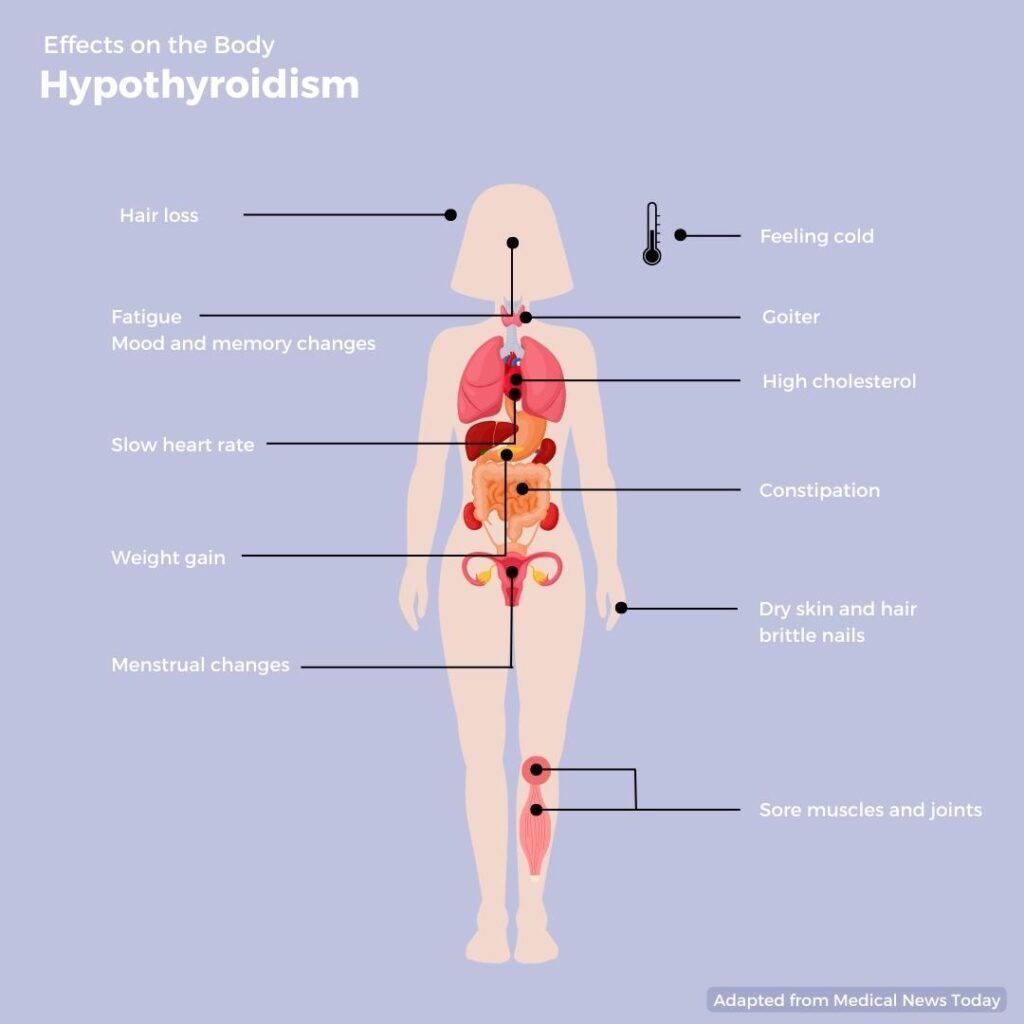Xcode Life's Hypothyroidism DNA Report
Researchers have identified several genes associated with hypothyroidism.
In the sample report below, we've attempted to analyze some important genes that increase the risk of hypothyroidism.
You can identify your genetic risk of hypothyroidism by using your 23andMe DNA data and placing an order for the Gene Health Report.
Thyroid Diseases: An Overview
The thyroid is an essential gland located in the neck region.
It is vital in ensuring your body functions normally, including metabolism, growth, and development.
The thyroid gland regulates the various organ systems in the body by producing hormones.
The two most common thyroid hormones are T3 (triiodothyronine) and T4 (thyroxine).
When the thyroid produces too little to too much of these thyroid hormones, it gives rise to thyroid disease.
There are different types of thyroid diseases, including:
- Hyperthyroidism
- Hypothyroidism
- Thyroiditis
- Hashimoto’s thyroiditis
- Pituitary disorder
What Is Hypothyroidism? Causes and Symptoms
Hypothyroidism is a common thyroid disease in which the thyroid gland produces too little hormones in the blood.
As a result, metabolism slows down.
Hypothyroidism is characterized by an underactive thyroid that may give rise to symptoms like:
- Extreme fatigue
- Weight gain
- Constipation
- Numbness or tingling in the hands
- Muscle weakness in the body
- High blood cholesterol levels
- Dry skin, coarse hair
- Frequent and heavy periods
- Droopy eyelids, puffy face
- Decrease in sexual activity
- Feeling depressed
There are several reasons why the thyroid gland fails to produce sufficient hormones, resulting in hypothyroidism. These include:
- Personal or family history of an autoimmune disease
- History of anti-thyroid medications taken for hyperthyroidism (Over response to thyroid treatment)
- Treatment with radioactive iodine
- Thyroid surgery
- Radiation of the head and neck area
- Pregnancy
- Iodine deficiency
Is Hypothyroidism Genetic?
Two genes associated with congenital hypothyroidism are the PAX8 and TSHR.
Both these genes play a role in the growth and development of the thyroid gland.
Abnormal changes (mutations) in these genes affect the normal development of the gland, resulting in reduced or no production of thyroid hormones.
Hypothyroidism that results from thyroid dyshormonogenesis (hormone production is affected) occurs due to mutations in a few genes, including DUOX2, SLC5A5, TG, and TPO.
Mutations in these genes disrupt the thyroid hormone formation process, leading to reduced levels.
A mutation in the TSHB gene affects the synthesis of thyroid hormone by affecting the stimulation process.
The MTHFR gene and Hypothyroidism
Another critical gene studied for Hashimoto’s thyroiditis and hypothyroidism is the MTHFR gene.
Methylenetetrahydrofolate reductase or MTHFR gene gives instructions for producing an enzyme that breaks down amino acid homocysteine.
A mutation in the MTHFR gene causes several effects in the body and has been linked to over 60 chronic conditions.
A 2020 study stated that the C677T variant of the MTHFR gene was strongly associated with the development of hypothyroidism.
The risk of developing hypothyroidism increased in people having the T allele of the MTHFR gene.
Will I Get Hypothyroidism If My Mother Has It?
Over 75% of people with a thyroid condition have a family member with the condition.
However, congenital hypothyroidism cases are sporadic and occur in people with no family history.
When congenital hypothyroidism is inherited, it follows an autosomal recessive inheritance.
This means an individual should have two copies of the mutated or abnormal gene from both parents to develop the condition.
Who’s At Most Risk For Hypothyroidism?
The risk for hypothyroidism is highest in women over 50. Other factors that may increase the risk for hypothyroidism are:
- Family history of thyroid disease
- Having an autoimmune condition like type 1 diabetes or celiac disease
- Treatment with anti-thyroid medications
- Partial thyroidectomy or other thyroid surgery
- Pregnancy or having delivered a baby in the last six months
- Radiation to the head and neck region
Can You Be Born With Hypothyroidism? Congenital Hypothyroidism
Some children are born with an underdeveloped or dysfunctional thyroid.
When this condition is left untreated, congenital hypothyroidism can lead to intellectual disability and growth failure.
In around 80% to 85% of cases of congenital hypothyroidism, the thyroid gland is absent, smaller in size, or abnormally located. This is called thyroid dysgenesis.
In very few cases, the reduction or absence of thyroid hormone production is due to impaired stimulation from the pituitary gland in the brain.
Though congenital hypothyroidism can occur due to various factors, 15% to 20% are genetic.
The most common cause of congenital hypothyroidism is a deficiency of iodine in the mother’s diet.
Genetic Test For Hypothyroidism
If the doctor suspects an individual to have hypothyroidism, they may recommend a thyroid panel test.
These are blood tests that detect the levels of thyroid hormones.
A genetic test analyzes genes associated with hypothyroidism and checks if you have any variants (or gene changes) that could increase the risk for this condition.
Genetic testing for hypothyroidism can help in the following ways:
- Understand your likelihood of developing the condition
- Provide actionable insights for reducing the risk
- Flag the condition before even you develop symptoms
- Enable early screening and diagnosis
Summary: Is Hypothyroidism Genetic?
- The thyroid is a vital gland that regulates several bodily functions and processes, including metabolism, growth, and development.
- There are several causes for hypothyroidism, including autoimmune disease, hyperthyroid treatment, thyroid surgery, and medications.
- Hypothyroidism has a strong genetic component with mutations in a few genes like PAX8, TSHR, and MTHFR known to increase the risk for the condition.
- Non-genetic risk factors for hypothyroidism include female sex, older age (60+), medical conditions like autoimmune disorders, and thyroid surgery.
- Hypothyroidism is diagnosed with thyroid profile blood tests or a genetic test to detect the presence of mutations in one or more genes.
References
- https://medlineplus.gov/genetics/condition/congenital-hypothyroidism/
- https://www.ncbi.nlm.nih.gov/pmc/articles/PMC3219766/
- https://health.clevelandclinic.org/thyroid-disease-may-run-in-your-family-and-you-might-not-know-it/
- https://www.everlywell.com/blog/thyroid/are-thyroid-problems-genetic/
- https://my.clevelandclinic.org/health/diseases/8541-thyroid-disease
- https://www.ncbi.nlm.nih.gov/pmc/articles/PMC7490122/







